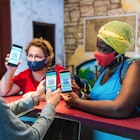
May 4, 2022 ÔÇó 1 min read

Aug 25, 2021 ÔÇó 4 min read

Greece has introduced new vaccination measures to combat rising infections ┬®Getty Images
Only people who can prove they have been vaccinated against COVID-19 will be permitted to enter indoor restaurants, bars and entertainment venues in Greece from September.
As the Delta variant continues to drive COVID-19 cases in Greece, with the country now in a fourth wave of the pandemic, the Greek government will soon start asking businesses to verify patrons' vaccination status before they can dine or drink indoors. Previously people could present a negative test if they didn't have the jab but now only vaccinated patrons will be allowed inside. The measures will last from September 13 until March 31, to allow Greece's vaccination campaign to gather momentum.
Similar measures will also apply to some public transport networks; and while people don't need to be vaccinated to visit museums, archaeological sites and theaters, they will need to present a negative test result to enter instead. The rules apply to adults and children between the ages of 12 and 17.
Read more: Do you need a visa to go to Greece?

"The duty of the state is to protect public health and it does so with these measures," the . "It is our duty to our fellow citizens who lost the battle before the vaccine, to those who spent the night in hospitals treating patients, to those who are vaccinated to build a wall of immunity."
The that Greece hit a record number of infections this week, surpassing March's peak, with hospitalizations and deaths rising in tandem with case numbers. But the country hopes that the vaccination campaign will protect people against the worst of the virus. To date, more than 5.6 million people are now fully vaccinated in Greece.
Read more: Best time to go to Greece
If you're traveling to Greece this year, here's what you need to know about the new measures and how they might affect your trip.

You'll need to show proof at any restaurant, bar, club, cafe or taverna in Greece, if you wish to go inside. You'll also need to present it at entertainment venues and open-air sports stadiums. People can also show proof of recent recovery (within the last six months) from the virus to dine and drink indoors. If you're visiting museums, archeological sites like the Acropolis, or theaters in Greece, you won't need to prove your vaccination status but you will need to present a negative COVID-19 result to enter if you're not vaccinated. That result can be taken from a rapid antigen test within the last 48 hours. Venues will also have the right to only permit vaccinated visitors, the health minister said.
If you plan to island hop in Greece, or enjoy some intercity travel, you're going to need to show proof of vaccination, recovery or a negative COVID-19 test result if you take a boat or board a plane or a long-distance bus. Children between the age of five and 12 will need to show a negative self-test certificate done 24 hours earlier and their results can be uploaded .
Sports clubs and gyms will also require require mandatory vaccination or certification of recovery from their members.

Travelers visiting Greece who have an EU digital COVID certificate can use that to enter venues. Official health certificates from Schengen Zone countries are also easily recognized in Greece. If you're coming from a country outside the EU, in theory you should be able to present your printed or electronic vaccination certificate, according to the US Embassy in Greece. However, it advises people "to be patient with businesses working to comply with Greek health measures and also have a Plan B to try another business." All certificates must include all relevant information (number of doses, dates etc.) and be presented in either Greek, English, German, French, Italian, Spanish or Russian.
Tests are widely available in Greece and rapid tests will cost Ôé¼10 for people who are not vaccinated. They're free for people who are vaccinated.
Greece accepts a wide range of vaccines including Pfizer, Moderna, Astra Zeneca, Novavax, Johnson & Johnson, Sinovac, Sputnik, Cansino Biologics and Sinopharm. To be considered fully vaccinated, at least 14 days must have passed since your last recommended dose.
How to get around in Greece
12 essential places to visit in Greece
The 12 best beaches in Greece

Air Travel
Spain and Italy keeping face covering on flights, despite Europe dropping mask mandateMay 16, 2022 ÔÇó 4 min read

May 4, 2022 ÔÇó 1 min read


Apr 8, 2022 ÔÇó 4 min read

Mar 2, 2022 ÔÇó 6 min read

Feb 14, 2022 ÔÇó 2 min read

Feb 3, 2022 ÔÇó 3 min read

Nov 30, 2021 ÔÇó 6 min read

Nov 29, 2021 ÔÇó 6 min read
